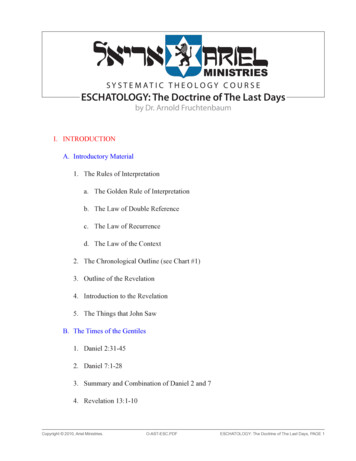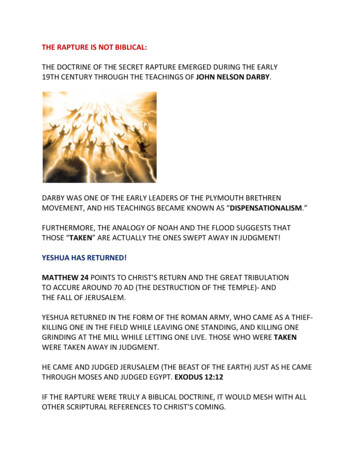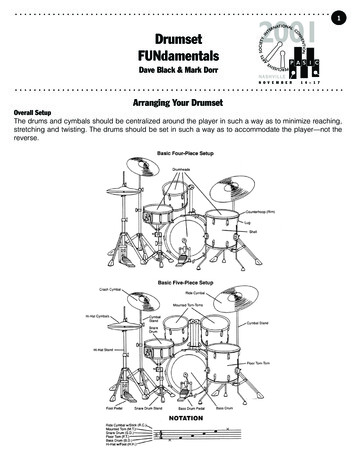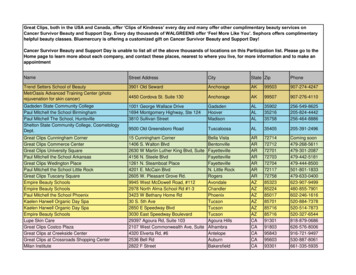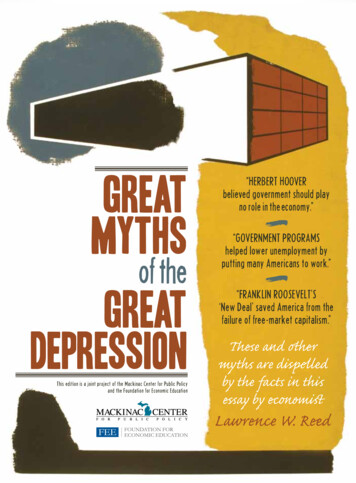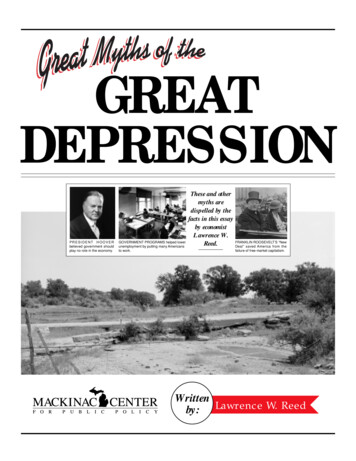
Transcription
THE GREATTRIBULATION
Other books by David ChiltonProductive Christians in an Ageof Guilt-Manipulators, 1981Paradise Restored: A Biblical Theologyof Dominion, 1985The Days of Vengeance: An Exposition ofthe Book of Revelation, 1987Power in the Blood: A ChristianResponse to AIDS, 1987
THE GREATTRIBULATIONDavid ChiltonInstitute for Christian EconomicsTyler, Texas
Copyright 1987 [1997]by Dominion PressAll rights reserved. Written permission must be securedfrom the publisher to use or reproduce any part of this book,except for brief quotations in critical reviews or articles.Published by Dominion PressP.O. Box 7999, Tyler, Texas 75711Printed in the United States of AmericaLibrary of Congress Cataloging-in-Publication DataChilton, David.The great tribulation / David Chilton.p.em.Originally published: Ft. Worth, Tex. : Dominion press,1987. Includes indexes.ISBN 0-930462-55-61. Theology-eschatology. 2. New Testamentprophecy. 3. Jewish history-fall of Jerusalem.4. The Antichrist. 5. Symbolism-Bible. 6. Bible- hermeneuticsI. Title.BT821. 2. C44 1996236' .9 - dc2096-26306CIP
TABLE OF CONTENTSPUBLISHER'S PREFACE1. The Terminal Generation2. Coming on the Clouds3. The Coming of the Antichrist4. The Last Days5. The Coming of the New Covenant6. The Four Horsemen7. Vengeance for the Martyrs8. The Book Is Opened9. Jerusalem Under Siege10. All Creation Takes Vengeance11. It Is Finished!SCRIPTURE ER'S EPILOGUE by Gary North . 171
PUBLISHER'S PREFACEby Gary NorthThe Lord said unto my Lord, Sit thou at my righthand, until I make thine enemies thy footstool. TheLord shall send the rod ofthy strength out ofZion: rulethou in the midst of thine enemies (Psalm 110:1-2).Then cometh the end, when he shall have deliveredup the kingdom to God, even the Father; when he shallhave put down all rule and all authority and power.For he must reign, till he hath put all enemies under hisfeet. And the last enemy that shall be destroyed is death(I Corinthians 15:24-26).The Bible teaches that Jesus shall reign over theearth. Once it begins, there will be no interruptionof His earthly reign over this earth in history untildeath shall at last be conquered. But we know thatdeath ends only on the final day, when Christ putsan end to Satan's final rebellion, when the devil iscast into the lake of fire (Revelation 20:7-10).The key kingdom question is: When will His
vIII THE GREAT TRIBULATIONreign over earth begin? Jesus was very clear aboutthis. He told His disciples after His resurrection:All power is given unto me in heaven and inearth. Go ye therefore, and teach all nations,baptizing them in the name of the Father, andof the Son, and of the Holy Ghost: teachingthem to observe all things whatsoever I havecommanded you: and 10, I am with you alway,even unto the end of the world. Amen (Matthew 28:18-20).So, all power in heaven and in earth has alreadybeen given to Christ. Already! We know also that Heis reigning with God in heaven.And what is the exceeding greatness of hispower to us-ward who believe, according to theworking of his mighty power, which he wroughtin Christ, when he raised him from the dead,and set him at his own right hand in the heavenly places, far above all principality, andpower, and might, and dominion, and everyname that is named, not only in this world, butalso in that which is to come: and hath put allthings under his feet, and gave him to be thehead over all things to the church, which is hisbody, the fulness of him that filleth all (Ephesians 1:19-23).Is Christ the head of the church today? Paul saidthat He is. But what else is also true today, accordingto Paul? The passage is clear: Jesus Christ now rules
PUBLISHER'S PREFACEIxthe earth from heaven above. He is presently over allprincipality, power, might, and dominion. What arethese? They are demonic spirits. Paul wrote in thissame epistle: "For we wrestle not against flesh andblood, but against principalities, against powers,against the rulers of the darkness of this world, againstspiritual wickedness in high places" (Ephesians 6:12).God is in control. Jesus is in control. All thingsare n pr nc ple under Jesus' feet. It is true that n history, evil beings still have power. We as Christ's people wrestle spiritually against them. The war between good and evil, between right and wrong, goeson daily in the life of every Christian and in the lifeof every society. But, in principle, life is stronger thandeath, for Jesus' resurrection has proven this. Theresurrection is more powerful than the cross. Light ismore powerful than darkness (John 1:9). Good ismore powerful than evil, for Christ now reigns fromon high. The legacy of the "second Adam," JesusChrist, is more powerful in history than the legacy ofthe first Adam. Grace is more powerful than sin.You believe this, don't you?Why Fear a "Great Tribulation"?Why, then, should Christians believe that somegreat tribulation faces them in the future - a tribulation so great that nothing like it in history has everoccurred? Not all Christians believe that they will gothrough the tribttlation, although post-tribulationpremillennialists do. But if God reigns from on high,why should Christians expect anything worse thanthe "normal" holocausts of the twentieth century-
XTHE GREAT TRIBULATIONthe persecutions and genocides of Armenians, Jews,Russian kulaks, Ukrainians, and Cambodians?These were indeed terrible events, and there maywell be more of them, but why should Christians expect that another event will occur that is fundamentally worse?The answer is: they shouldn't. Why not? Becausethe great tribulation is behind us. This is what DavidChilton argues in The Great Tribulation. Jesus warnedHis people of a great tribulation to come in the verynear future. In the chapter on the great tribulationin Matthew, Christ's words are recorded: "Verily Isay unto you, This generation shall not pass, till allthese things be fulfilled" (Matthew 24:34). We knowfrom the parallel passage in Luke that the great tribulation would be the destruction of JerusalerIl by anarmy, which turned out to be the Roman army:And when ye shall see Jerusalem compassed with armies, then know that the desolation thereof draweth nigh. Then let them whichare in Judea flee to the mountains; let themwhich are in the midst of it depart out; and letnot them that are in the countries enter thereinto. For these be the days of vengeance, thatall things which are written may be fulfilled(Luke 21:20-22).David Chilton's magnificent commentary on theBook of Revelation is appropriately called The Daysof Vengeance (Dominion Press, 1987). This little bookis a brief survey of those sections of Revelation that
PUBLISHER'S PREFACEdeal with the fall of Jerusalem inA.D.xl70.Are lTou Looking Forward to Disaster?It may sound strange to many readers that thegreat tribulation is behind us. This view has beenquite common throughout church history, but overthe last hundred years or so, many Bible-believinggroups have adopted a different view: that the greattribulation will happen to Israel (or to everyone, including Christians) in the future, and probably inthe near future. Most dispensationalists believe thatthe church will be "raptured" out of the world beforethe great tribulation takes place; post-tribulation dispensationalists and traditional non-dispensationalpremillennialists believe that the church will gothrough the great tribulation.What the Bible teaches is that it took place inA.D. 70, and Christians did not go through it.This book introduces readers to the theology ofjudgment: specifically, God's judgment sanctionsagainst Israel. The sanctions were curses. God gaveblessings to the church and cursings to rebelliousIsrael, which had crucified the Lord and publiclycalled God's judgment down on themselves: "Thenanswered all the people, and said, His blood be onus, and on our children" (Matthew 27:25). God'scursings on ancient Israel in A.D. 70 matched theircrime, the crucifixion of Christ. This crime was thegreatest (worst) in history; their punishment wasalso the greatest (worst) in history. To call anythingelse "the great tribulation" is to downplay the immensity of that generation's crime.
xII THE GREAT TRIBULATIONOur Comprehensive ResponsibilityI realize that this will disappoint many Christians. If the great tribulation is over, then the Rapture is not scheduled to take place prior to this tribulation. The rapture of the saints - the resurrection ofdead saints and the instant transformation of thosestill alive on earth (I Corinthians 15:52)- gets delayed until the final act of history, when Satan rebelsand Christ comes back to judge the world (Revelation 20:7-10). This means that until then, Christianswill remain on earth as God's delegated agents ofjudgment in history, preaching the gospel, applyingGod's law to every area of life, and progressivelysubduing the earth to the glory of God (Genesis 1:2628). This means that there will be no earthly escape forchurch members from the progressively heavy responsibilitiesof exercising dominion.Sadly, there are millions of Christians today whohave adopted a philosophy of the future that teachesthat most people will die and go to hell- and then betossed into the lake of fire for all eternity (Revelation20:14)-and nothing the church can do will be ableto overcome their resistance to the gospel. The HolySpirit will simply never change the hearts of a majority of mankind. They will inevitably perish. Withover 5 billion people alive today, and with billionsmore to be born in the next 40 years, this is a pessimistic doctrine of the future. Yet today's Christiansprefer to believe in this horrible scenario than to believe in the growth of the church and the triumph ofthe gospel, for such a triumph would place tremendous responsibility on those who call themselvesChristians. They really would rather see billions of
PUBLISHER'S PREFACExIIIpeople perish eternally than to admit to themselvesthat they, as Christians, will be called on by God totake responsibility in this world - in the areas thatmany Christians call "secular"- because of a world.wide revival.We who call ourselves Christian Reconstructionists proclaim a future worldwide revival and thesteady, voluntary submission of people to God's law.We believe that Christians will steadily be given responsibilities in every area of life in a world that hasrun out of workable answers. God will give us theseresponsibilities, but not through revolution or tyranny.Instead, He will give us these responsibilities in history through the voluntary submission of those whohave no other hope, and who (until that final rebellion of Revelation 20) will be willing to allow Christians to bear these social, political, military, and economic responsibilities.We believe in revival. We believe in evangelismand foreign missions. So do all Christians. But weReconstructionists have this unique outlook: we believethat these gospel efforts will be successful in history. When wecall other Christians to intensify their efforts to spreadthe gospel, we offer them this unique motivation:their efforts will eventually prove successful in history.The gospel ofJesus Christ will not prove to be a failure in history. The power of the resurrection is greaterthan the power of the devil and his human followersto resist the most powerful message in man's history:that Jesus Christ has borne the sins of man, and thatevil has in principle been overcome. As time goeson, this gospel will triumph in history.
xivTHE GREAT TRIBULATIONMankind's New BeginningIt is one of those oddities of recent intellectualhistory that perhaps the most succinct and perceptive comment on the Christian view of history is provided by a secular Jew who teaches law at HarvardUniversity. In the Introduction to his book, Law andRevolution: The Formation oj the Jtestern Legal Tradition,published by Harvard University Press in 1983,Harold J. Berman makes a crucial observation onthe centrality of the resurrection in Christian historical thought. He begins with an important insight into the Hebrew attitude toward historical time:In contrast to the other Indo-European peoples, including the Greeks, who believed thattime moved in ever recurring cycles, theHebrew people conceived of time as continuous, irreversible, and historical, leading to ultimate redemption at the end. They also believed, however, that time has periods within it.It is not cyclical but may be interrupted or accelerated. It develops. The Old Testament is astory not merely of change but of development,of growth, of movement toward the messianicage-very uneven movement, to be sure, withmuch backsliding but nevertheless a movementtoward.Berman then goes on to explain how Christianityadopted this view of linear time, but added a keynew element:
PUBLISHER'S PREFACEXVChristianity, however, added an importantelement to the Judaic concept of time: that oftransformation of the old into the new. TheHebrew Bible became the Old Testament, itsmeaning transformed by its fulfillment in theNew Testament. In the story of the Resurrection, death was transformed into a new beginning. The times were not only accelerated butregenerated. This introduced a new structureof history, in which there was a fundamentaltransformation of one age into another. Thistransformation, it was believed, could onlyhappen once: the life, death, and resurrectionof Christ was thought to be the only major interruption in the course of linear time from thecreation of the world until it ends altogether(pp. 26-27).,The Great Tribulation shows that this transformation of the old order into Christ's new order wasdecisively manifested in the public termination ofthe old order: the fall of Jerusalem and the destruction of the temple and its sacrificial system. This wasthe shaking of the foundations in history.Modern Christians are almost totally unfamiliarwith the events of A.D. 70. The eschatological viewpoints that predict the great tribulation in the futureled to the neglect in popular Christian literature ofthe story of the fall of Jerusalem. David Chilton hasperformed a major educational service to the churchof Jesus Christ in reminding us what a momentousevent the fall of Jerusalem was. From the fall of
xvi THE GREAT TRIBULATIONJerusalem until the future conversion of the Jews (Romans 11), which will inaugurate a period of unprecedented earthly blessings (vv. 12-15), nothing else comesclose as a public manifestation of Christ's new order.What we need to understand is that Satan is agreat imitator. God defeated him at Calvary, but hestill· seeks to defeat Christians in their lives. God imposed a great tribulation on the old order of theapostate Hebrews, but Satan imitates God by imposing holocausts on mankind through his followers.Christ inaugurated a new world order, and soSatan's followers now promise to bring us a newworld order. The Marxists do, the Nazis did, andthe New Age movement does. It is all a counterfeit.Accept no substitutes! Remember Christ's words:"But if I cast out devils by the Spirit of God, then thekingdom of God has come unto you" (Matthew12:28). He cast out devils by the Spirit of God, so thekingdom of God had come to them. It is now our inheritance as members of Christ's new nation, thechurch, for He told the Jews of His day: "The kingdom of God shall be given to a nation bringing forththe fruits thereof" (Matthew 21:43). Christ's newworld order has come, and the fall of Jerusalem isproof. As Berman says of the resurrection: "This introduced a new structure of history, in which therewas a fundamental transformation of one age intoanother. This transformation, it was believed, couldonly happen once: the life, death, and resurrectionof Christ was thought to be the only major interruption in the course of linear time from the creation ofthe world until it ends altogether." The worst is over!
1THE TERMINAL GENERATIONOne of the most basic principles for an accurateunderstanding of the Bible's message is that Scriptureinterprets Scripture. The Bible is God's holy, infallible,inerrant Word. It is our highest authority. Thismeans that we cannot seek for an authoritative interpretation of Scripture's meaning anywhere outside ofthe Bible itself. It also means that we must not interpret the Bible as if it dropped out of the sky in thetwentieth century. The New Testament was writtenin the first century, and so we must try to understandit in terms of its first-century readers. For example,when John called Jesus "the Lamb of God," neitherhe nor his hearers had in mind anything remotelysimilar to what the average, modern man-on-the.street might think of if he heard someone called a"lamb." John did not mean Jesus was sweet, cuddly,nice, or cute. In fact, John wasn't referring to Jesus'"personality" at all. He meant that Jesus was the sinless Sacrifice for the world. How do we know this?Because the Bible tells us so.
2THE GREAT TRIBULATIONThis is the method we must use in solving everyproblem of interpretation in the Bible - includingthe prophetic passages. That is to say, when we reada chapter in Ezekiel, our first reaction must not be toscan the pages of the New Thrk Times in a franticsearch for clues to its meaning. The newspaper doesnot interpret Scripture, in any primary sense. Thenewspaper should not decide for us when certain prophetic events are to be fulfilled. Scripture interpretsScripture.This GenerationIn Matthew 24 (and Mark 13 and Luke 21) Jesusspoke to His disciples about a "Great Tribulation"which would come upon Jerusalem. It has becomefashionable over the past 100 years or so to teach thatHe was speaking about the "end of the world" andthe time of His Second Coming. But is this what Hemeant? We should note carefully that Jesus Himselfgave the (approximate) date of the coming Tribulation, leaving no room for doubt after any careful examination of the Biblical text. He said:Truly I say to you, this generation will notpass away until all these things take place(Matthew 24:34).This means that everything Jesus spoke of in thispassage, at least up to verse 34, took place before the generation then lz'ving passed away. "Wait a minute," yousay. "Everything? The witnessing to all nations, theTribulation, the coming of Christ on the clouds, the
THE TERMINAL CENEftATIONSstars falling . . . everything?" Yes - and, incidentally,this point is a very good test of your commitment tothe principle we began with in this chapter.Scripture interprets Scripture, I said; and you noddedyour head and yawned, thinking: "Sure, I know allthat. Get to the point. Where do the atomic blastsand killer bees come in?" The Lord Jesus declaredthat "this generation" - people then living - would notpass away before the things He prophesied tookplace. The question is, do you believe Him?Some have sought to get around the force of thistext by saying that the word generation here reallymeans race, and that Jesus was simply saying that theJewish race would not die out until all these thingstook place. Is that true? I challenge you: Get outyour concordance and look up every New Testamentoccurrence of the word generation (in Greek, genea)and see if it ever means "race" in any other context.Here are all the references for the Gospels: Matthew1:17; 11:16; 12:39, 41, 42, 45; 16:4; 17:17; 23:36;24:34; Mark 8:12, 38; 9:19; 13:30; Luke 1:48, 50;7:31; 9:41; 11:29, 30, 31, 32, 50, 51; 16:8; 17:25; 21:32.Not one of these references is speaking of the entireJewish race over thousands of years; all use the wordin its normal sense of the sum total of those living at thesame time. It always refers to contemporaries. (In fact,those who say it means "race" tend to acknowledgethis fact, but explain that the word suddenly changesits meaning when Jesus uses it in Matthew 24! Wecan smile at such a transparent error, but we shouldalso remember that this is very serious. We are dealing with the Word of the living God.)
4THE GREAT TRIBULATIONThe conclusion, therefore - before we even beginto investigate the passage as a whole - is that theevents prophesied in Matthew 24 took place within the lifetime of the generation which was then living. It was thisgeneration which Jesus called "wicked and perverse"(Matthew 12:39,45; 16:4; 17:17); it was this "terminalgeneration" which crucified the Lord; and it was thisgeneration, Jesus said, upon which would come thepunishment for "all the righteous blood shed on theearth" (Matthew 23:35).All These ThingsTruly I say to you, all these things shallcome upon this generation. 0 Jerusalem, Jerusalem, who kills the prophets and stones thosewho are sent to her! How often I wanted togather your children together, the way a hengathers her chicks under her wings, and youwere unwilling. Behold, your house is beingleft to you desolate! (Matthew 23:36-38).Jesus' statement in Matthew 23 sets the stage forHis teaching in Matthew 24. Jesus clearly told of animminent judgment on Israel for rejecting the Wordof God, and for the final apostasy of rejecting God'sSon. The disciples were so upset by His prophecy ofdoom upon the present generation and the "desolation" of the Jewish "house" (the Temple) that, whenthey were alone with Him, they could not help butask for an explanation.And Jesus came out of the Temple and wasgoing away when His disciples came up to
THe TeRMINAL GeNeRATION5point out the Temple buildings to Him. AndHe said to them, "Do you not see all thesethings? Truly I say to you, not one stone hereshall be left upon another, which will not betorn down." And as He was sitting on theMount of Olives, the disciples came to Himprivately, saying, "Tell us, when will thesethings be? And what will be the sign of Yourcoming, and of the end of the age?" (Matthew24:1-3).Again, we must take careful note that Jesus wasnot speaking of something that would happen thousands ofyears later, to some future temple. He was prophesyingabout "all these things," saying that "not one stone hereshall be left upon another." This becomes evenclearer if we consult the parallel passages:And as He was going out of the Temple,one of His disciples said to Him, "Teacher,behold what wonderful stones and what wonderful buildings!" And Jesus said to him, "Doyou see these great buildings? Not one stone shallbe left upon another which will not be torndown" (Mark 13:1-2).And while some were talking about theTemple, that it was adorned with beautifulstones and votive gifts, He said, "As for thesethings which you are looking at, the days will comein which there will not be left one stone uponanother which will not be torn down" (Luke21:5-6).
6THE GREAT TRIBULATIONThe only possible interpretation of Jesus' wordswhich He Himself allows, therefore, is that He wasspeaking of the destruction of the Temple which thenstood in Jerusalem, the very buildings which the disciples beheld at that moment in history. The Templeof which Jesus spoke was destroyed in the fall ofJerusalem to the Roman armies in A.D. 70. This isthe only possible interpretation ofJesus' prophecy inthis chapter. The Great Tribulation ended with the destruction of the Temple in A.D. 70. Even in the (unlikely)event that another temple should be built sometimein the future, Jesus' words in Matthew 24, Mark 13,and Luke 21 have nothing to say about it. He wastalking solely about the Temple of that generation.There is no Scriptural basis for asserting that anyother temple is meant. Jesus confirmed His disciples'fears: Jerusalem's beautiful Temple would be destroyed within that generation; her house would beleft desolate.The disciples understood the significance of this.They knew that Christ's coming in judgment to destroy the Temple would mean the utter dissolution ofIsrael as the covenant nation. It would be the signthat God had divorced Israel, removing Himselffrom her midst, taking the kingdom from her andgiving it to another nation (Matthew 21:43). Itwould signal the end of the age, and the coming ofan entirely new era in world history-the New WorldOrder. From the beginning of creation until A.D. 70,the world was organized around one central Sanctuary, one single House of God. Now, in the NewCovenant order, sanctuaries are established wher-
THE TERMINAL GENERATION7ever true worship exists, where the sacraments areobserved and Christ's special Presence is manifested.Earlier in His ministry Jesus had said: ' n hour iscoming when neither in this mountain, nor in Jerusalem, shall you worship the Father. But anhour is coming, and now is, when the true worshipers shall worship the Father in Spirit and truth"(John 4:21-23). Now Jesus was making it clear thatthe new age was about to be permanently establishedupon the ashes of the old. The disciples urgentlyasked: ''When will these things be, and what will bethe sign of your coming, and of the end of the age?"Some have attempted to read this as two or threeentirely separate questions, so that the discipleswould be asking first about the destruction of theTemple, and then about the signs of the end of theworld. This hardly seems credible. The concern ofthe immediate context (Jesus' recent sermon) is onthe fate of this generation. The disciples, in consternation, had pointed out the beauties of the Temple,as if to argue that such a magnificent spectacleshould not be ruined; they had just been silencedwith Jesus' categorical declaration that not one stonethere would be left upon another. There is nothingwhatsoever to indicate that they should suddenlychange subjects and ask about the end of the material universe. (The translation "end of the world" inthe King James Version is misleading, for the meaning of the English word world has changed in the lastfew centuries. The Greek word here is not cosmos[world], but aion, meaning eon or age.) The discipleshad one concern, and their questions revolved around
8THE GREAT TRIBULATIONone single issue: the fact that their own generationwould witness the close of the pre-Christian era andthe coming of the new age promised by the prophets.All they wanted to know was when it would come,and what signs they should look for, in order to befully prepared.Signs of the EndJesus responded by giving the disciples not one,but seven signs of the end. (We must remember that"the end" in this passage is not the end of the world,but rather the end of the age, the end of the Temple, thesacrificial system, the covenant nation of Israel, andthe last remnants of the pre-Christian era). It is notable that there is a progression in this list: the signsseem to become more specific and pronounced untilwe reach the final, immediate precursor of the end.The list begins with certain events which would occur merely as "the beginning of birth pangs" (Matthew 24:8). In themselves, Jesus warned, they werenot to be taken as signals of an imminent end; thusthe disciples should guard against being misled onthis point (v. 4). These ''beginning'' events, markingthe period between Christ's resurrection and theTemple's destruction in A.D. 70, were as follows:1. False Messiahs. "For many will come inMy name, saying, 'I am the Christ,' and willmislead many" (v. 5).2. J#.zrs. "And you will be hearing of warsand rumors of wars; see that you are not frightened, for those things must take place, but that
THE TERMINAL GENERATION9is not yet the end. For nation will rise againstnation, and kingdom against kingdom" (vv.6-7a).3. Natural disasters. "And in various placesthere will be famines and earthquakes. But allthese things are merely the beginning of birthpangs" (vv. 7b-8).Anyone of these occurrences might have causedChristians to feel that the end was immediately uponthem, had not Jesus warned them that such eventswere merely general tendencies characterizing the finalgeneration, and not precise signs of the end. Thenext two signs, while they still characterize the period as a whole, do bring us up to a point near the endof the age:4. Persecution. "Then they will deliver youup to tribulation, and will kill you, and you willbe hated by all nations on account of My name"(v. 9).5. Apostasy. "And at that time many will fallaway and will betray one another and hate oneanother. And many false prophets will arise,and will mislead many. And because lawlessness is increased, the love of many will growcold. But the one who endures to the end, heshall be saved" (vv. 10-13).The last two items on the list are much more specific and identifiable than the preceding signs. Thesewould be the final, definitive signs of the end - one
10 THE GREAT TRIBULATIONthe fulfillment of a process, and the other a decisiveevent:6. Worldwide evangelization. "And this Gospel of the Kingdom shall be preached in thewhole world for a witness to all the nations, andthen the end shall come" (v. 14).At first glance, this seems incredible. Could theGospel have been preached to the whole world within a generation of these words? The testimony ofScripture is clear. Not only could it have happened,but it actually did. Proof? A few years before the destruction of Jerusalem, Paul wrote to Christians inColossae of "the Gospel which has come to you, justas in all the world also it is constantly bearing fruit andincreasing" (Colossians 1:5-6), and exhorted themnot to depart "from the hope of the Gospel that youhave heard, which was proclaimed in all creation underheaven" (Colossians 1:23). To the church at Rome,Paul announced that "your faith is being proclaimedthroughout the whole world" (Romans 1:8), for thevoice of Gospel preachers "has gone out into all theearth, and their words to the ends of the world"(Romans 10:18). According to the infallible Word ofGod, the Gospel was indeed preached to the wholeworld, well before Jerusalem was destroyed in A.D.70. This crucial sign of the end was fulfilled, as Jesushad said. All that was left was the seventh, final sign;and when this event occurred, any Christi
What the Bible teaches is that it took place in A.D. 70, and Christians did not go through it. This book introduces readers to the theology of judgment: specifically, God's judgment sanctions against Israel. The sanctions were curses. God gave blessings to the church and cursings to rebellious Israel, which had crucified the Lord and publicly


